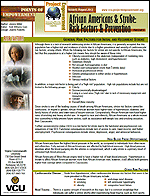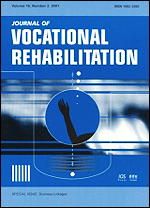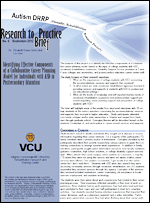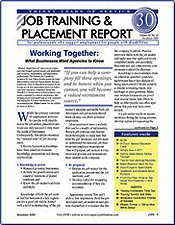Information, resources and research about work and disability issues
VCU Autism Center for Excellence Webcast
 Strategies and Supports to Address the Hidden Curriculum – Part 2
Strategies and Supports to Address the Hidden Curriculum – Part 2
Date: 12/11/2012 |
3:30 - 4:30 pm ET
By: Brenda Smith Myles, Ph.D.
Once it has been determined that specific social skills are missing, the next step is to ensure that planned instruction is provided using evidence-based practices. This presentation will overview a number of strategies and supports that can be used to teach the hidden curriculum to ensure a socially competent student. These strategies and supports can be implemented in general and special education settings and used at the elementary and secondary levels. Learning Objectives:
- Name strategies that support the instruction of hidden curriculum items.
- Match strategies to learner characteristics.
- Describe how to implement strategies into the learner's day.
Register for this webcast. Cost: $50. * Free to Virginia participants.
VCU-ACE is funded by VA DOE (Grant # 881-61172 H027A100107). For additional information, contact autismcenter@vcu.edu or (855) 711-6987.
Center on Transition to Employment Webinar
![]() The Personnel Factor:
Attributes of Highly Successful Employment Specialists
The Personnel Factor:
Attributes of Highly Successful Employment Specialists
Wed., Dec. 19, 2012, 1:00-2:00 pm
The Center on Transition to Employment invites you to an informational webinar on new research into the characteristics of employment specialist and their implications for successful transition to paid jobs for transition-age youth.
Drs. George Tilson and Monica Simonsen will share the four personal attributes that emerged from this study and discuss implications for recruitment, hiring, training and advancing effective employment specialists.
Registration is free and open - https://www2.gotomeeting.com/register/974393410
Project Empowerment - Points of Empowerment
 African Americans & Stroke: Risk Factors and Prevention
African Americans & Stroke: Risk Factors and Prevention
General Risk Factors for Initial and Recurrent Stroke - Although there is a lack of research addressing stroke in African Americans, it is generally accepted that this population has a higher risk and incidence of stroke due to a higher prevalence and severity of cardiovascular risk factors, among others. While the following risk factors for stroke are not specific to African Americans, the
fact that this population is at a higher risk means they should be aware of these risks:
- Obesity concentrated in the abdomen
- Sedentary lifestyle
- Not enough fruit/vegetables in diet
- Alcohol over-consumption (more than 5 drinks daily)
- Increased psychosocial stress
- Genetic predisposition to either stroke or hypertension
- Infection
- Various medical factors
Find out More about Stroke Risk Factors
Research Study of the Month
 Prevocational services and supported employment wages
Prevocational services and supported employment wages
by Nazarov, Z., Golden, T. & von Schrader, S.
Abstract - Using an observational approach, we investigate the relationship between the receipt of prevocational services and subsequent hourly wages of consumers participating in supported employment programs. To evaluate the potential impact of these services on wages of consumers, we use six years (2005–2010) of data from of the New York Integrated Supported Employment Report (NYISER) data management system. Results indicate that receipt of prevocational services has a negative correlation with hourly wages of consumers. This finding suggests that prevocational services may have detrimental effects on providers' and consumers' expectations on consumers' work ability and productivity resulting in reduced hourly wages. Furthermore, participation in prevocational services may serve as a signal to employers about consumer's productivity.
Read this JVR article
Autism DRRP Research to Practice
 Identifying Effective Components of a Collaborative Career Planning Model for Individuals with ASD in Postsecondary Education
Identifying Effective Components of a Collaborative Career Planning Model for Individuals with ASD in Postsecondary Education
By: Elizabeth Evans Getzel & Lori Briel
The purpose of this project is to identify the effective components of a collaborative career planning model based on the input of college students with ASD, vocational rehabilitation counselors, Disability Support Service providers in 2 and 4 year colleges and universities, and postsecondary education career center staff. The study focuses on three research questions:
- What are the experiences of college students with ASD concerning the accommodations, services and supports they received?
- To what extent are state vocational rehabilitation agencies involved in providing services and supports to students with ASD in postsecondary educational settings?
- What are the levels of knowledge and self-reported training needs of vocational rehabilitation counselors and postsecondary support personnel regarding career planning support and preparation of college students with ASD?
This brief will highlight some of the results from structured interviews with 18 college students on the autism spectrum concerning the accommodations, services and supports they received in higher education. Read the Research to Practice Brief No. 6
Job Training & Placement Report (JTPR)
 Job Training & Placement Report (JTPR) has been serving supported employment professionals longer than any other publication of its kind – more than 35 years! This 8-page newsletter is a leading source of practical information for integrated employment professionals.
Each issue of JTPR is filled with practical information to help readers keep up with industry trends, and to develop new strategies to increase employment opportunities for your job-seeking clients. A subscription to JTPR also includes a number of monthly inserts.
Job Training & Placement Report (JTPR) has been serving supported employment professionals longer than any other publication of its kind – more than 35 years! This 8-page newsletter is a leading source of practical information for integrated employment professionals.
Each issue of JTPR is filled with practical information to help readers keep up with industry trends, and to develop new strategies to increase employment opportunities for your job-seeking clients. A subscription to JTPR also includes a number of monthly inserts.
Get a 1 Month Free Trial of the JTPR
 Worksupport.com
Worksupport.com